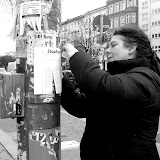
Today's post is mainly for those who could not have come to Zero Gallery and to take part in the evening of poetry. But before I come to this part I would like to quote a few words written by Ewa Maria Slaska who explains the idea and origins of our project.
"The title as well as the date of our meeting was carefully planned. Friday, the 13th is claimed to be a day of bad luck, and the reason for it is twofold. In the Christian countries it has a religious background. 13 is thought to be unlucky, for it was a number of people who took part in the Last Supper. And it was Judas, the thirtieth, who betrayed Jesus. When it comes to Friday, it was a day of Jesus death. In the ancient times, Friday, the 13th was supposed to bring good luck to all women. Friday was protected by the goddess of love. It was cultivated also by the Germanic people who devoted it to the goddess Freya. It is till that day, that in many languages the word for Friday stems from the name of Freya (Freitag, Friday,Fredag ), or Venus (Vendredi). 13 was also thought to be a lucky number in the ancient times. It was a number of the goddesses of the moon. The lunar calender had 13 months, and Luna was the main goddess of the ancient pre-patriarchal cultures. She had tens or maybe hundreds of names such as Isolde, Anahita, and Selene. Her symbolic animal was a cow, and there are some known images of goddesses-cows.
We have decided to celebrate this, as they say, unlucky day, with the help of the divine cow. It is also a very well know French cow, which laughs. The association was clear. We had to plan the project in the frames of French festival which theme was to be laugh. The French cow which laughs since more than half a century on the triangles of French melted cheese comes immediately to our heads. That is how we managed to combine the sacred and the profane in one poetical entity. Our idea was accepted and we've become a part of Printemps des Poetes in Berlin."
It was on Friday, the 13th that we met in the Zero Gallery. Even though we planned to start at about 8 pm we came one hour earlier to prepare gallery for that special occasion. As it turned out later on, it was worth coming a bit earlier as our first guest appeared at half past seven. The rest came on time, so that shortly after 8 pm Kasia Krenz the main poet of this evening started to read her new poem. After this very poetical beginning, it was time to the official one. The moderator and the organizer of the project Ewa Maria Slaska introduced the idea of the meeting and the poets. It was only poetry that was important after that initial part. Kasia Krenz was reading her poems in Polish, English and Portuguese. The German translations were read by Ewa and our guests-friends who participated in the meeting. For the evening with poetry and cows came mainly the inhabitants of Berlin: Poles, Italians, Israelis and Germans. One of our guest was also a Polish television, which came from Gdańsk specially for this evening. For the short breaks between the poems we prepared some sweet and salty snacks, all labelled with cows. This very nice evening with poetry ended shortly after noon.
As it turned out this famous bad luck on Friday, the 13th was just a rumour. Friday, the 13th can be claimed to be again a day of good luck. The project in the Zero Gallery went very well, in a nice and friendly atmosphere. Even the rain which started falling in the evening was warm and indicated the upcoming spring. On the Saturday's morning Berliners were woken up by the long awaited sun.
Ania MarczakGallery with pictures
The new volume of poems written by Kasia Krenz and translated into German by Ewa Maria Slaska, Karla Reimert, and Karl-Heinz Haase, will be published in Poland in 2009. Especially for the evening with poetry in the Zero Gallery, ten beautiful volumes of Kasia's poems were handmade by
Jacek Krenz, Kasia's husband.


























